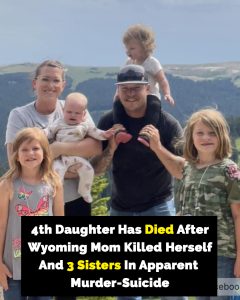A heartbreaking update has emerged in the tragic case involving Wyoming mother Tranyelle Harshman, who authorities say fatally shot her four daughters before taking her own life. Now, days after the initial incident, it has been confirmed that the fourth and final child involved in the shooting has also passed away, deepening the sorrow that has already touched countless people around the world.

The horrific events unfolded on February 10, 2025, when Tranyelle Harshman allegedly shot her four daughters in what appears to be a murder-suicide. According to police reports, she then turned the gun on herself. Among those who lost their lives that day were 9-year-old Brailey Blackmer, two-year-old twins Brooke and Jordan Harshman, and Tranyelle herself. Only 7-year-old Olivia Blackmer initially survived the shooting. She was quickly airlifted to a hospital in Salt Lake City in critical condition, as prayers for her recovery poured in from across the globe. Her story captured international attention, and many held out hope that she would overcome the devastating injuries.
Sadly, that hope was shattered on Sunday, February 16, when Olivia’s father, Quinn Blackmer, took to Facebook to share the news that his daughter had succumbed to her injuries. In a deeply emotional post, Quinn revealed that Olivia passed away on the afternoon of February 15 at 3:44 p.m.
“I know this isn’t the update people were hoping for, and we are absolutely gutted to make it,” Quinn wrote. “But we needed time to process what had happened before we let the world know of the tragic passing of Olivia yesterday afternoon.” His words conveyed a sense of unimaginable pain, as he continued, “The amount of devastation we feel and are going through is so much. Please give all families involved our time and space during this extremely difficult time in our life.”
Despite his grief, Quinn found a small degree of comfort in believing that his daughters are now reunited. “The peace I find is knowing that my babies don’t have to be apart from each other,” he said. “They can also be with their other sisters.”
The shocking case has left an entire community in mourning, as well as stunned observers around the world trying to come to terms with how such a tragedy could occur. Investigators have since revealed that 32-year-old Tranyelle Harshman had been struggling with several mental health conditions, including postpartum depression, post-traumatic stress disorder (PTSD), and clinical depression. These conditions, which affect thousands of people every year, can be debilitating and, if left untreated or misunderstood, may lead to tragic outcomes.
On the day of the incident, Tranyelle reportedly called police to confess to shooting her daughters and informed them of her intent to take her own life. Authorities responded swiftly, but it was too late to prevent the heartbreaking loss of life.
Tranyelle’s partner, Cliff Harshman, spoke publicly in the aftermath of the tragedy. He shared his heartbreak and emphasized that his wife was not a monster, but someone who had been suffering deeply from mental illness. In an interview with Cowboy State Daily, Cliff painted a picture of a woman overwhelmed by internal pain and misunderstood by many.
“My wife was not a monster,” he said firmly, hoping to bring attention to the often-invisible toll of mental illness. “Most people don’t understand how that affects the brain. It’s a chemical imbalance. And it can be exacerbated by trying to fix it with medication.”
Cliff’s comments highlight a critical issue in today’s society—how mental health challenges, especially among mothers dealing with postpartum depression, are still not adequately addressed. For many new mothers, postpartum depression is more than just “baby blues.” It is a serious, potentially life-threatening condition that can lead to despair, anxiety, and in extreme cases, thoughts of self-harm or harm to others. When coupled with other underlying mental health issues like PTSD and chronic depression, the results can be catastrophic.
Tranyelle’s story is a sobering reminder that mental health must be taken seriously and that those suffering should not be left to battle their demons alone. Support systems must be strengthened, and stigmas must be dismantled to prevent similar tragedies in the future. This devastating event has not only shattered a family but has also raised awareness about the urgent need for better mental health resources, intervention strategies, and public understanding.
As friends, family, and communities come together to mourn the lives of Brailey, Brooke, Jordan, Olivia, and Tranyelle, the overwhelming message is one of compassion and heartbreak. Candlelight vigils and online tributes have been created to honor the memory of the children, while GoFundMe campaigns have been set up to support the grieving family during this unimaginable time.
Quinn Blackmer, who now faces life without his daughters, has shown extraordinary courage in sharing his grief with the world. His openness has given voice to the countless parents and family members who have faced similar pain in silence. In honoring his daughters’ lives, Quinn hopes to spark greater compassion for those silently suffering through mental health crises.
This tragedy will leave a permanent mark on those who have followed it, not just because of the staggering loss of life, but also because of the very human struggles that were at its core. It is a call for society to reevaluate how it supports mothers, how it approaches mental illness, and how we come together in times of grief to offer not just sympathy but meaningful support.
In the end, the story of Tranyelle Harshman and her daughters is one of unimaginable sorrow, but also a wake-up call—a powerful, painful reminder of the silent battles so many people face behind closed doors. Let it be a moment not only to mourn but also to learn, reflect, and extend more love and understanding to those who may be quietly suffering around us.





